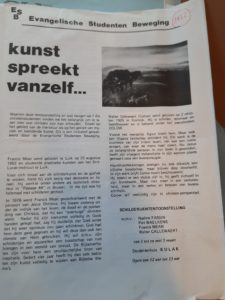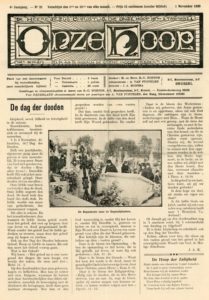At the time of writing this newsletter, we are in the last days of 2021. High time to bring you back up to date with the ins and outs of Evadoc within the framework of KADOC-KU Leuven.
Table of Contents
Children’s Dream
Provincial Training Evenings
Stand
Protestants Music and Performance Practices
Crowdfunding
Acquisitions
Heritage Consultant
Subscribe or Unsubscribe
Children’s Dream
Archives deposited at Evadoc can include audio cassettes. A good example is the personal archive of Jean-Claude Thienpont. In 1979, under the title “Kinderdroom” (Child’s Dream,) the student choir of the former Bible Institute Belgium recorded a number of songs on its own. Such a find is a good opportunity to highlight the archive and its creator.
Music
Jean-Claude Thienpont (Anderlecht/Brussels, * 1949) studied at the Royal Conservatorium of Music in Ghent. Between 1971 and 1978 he taught violin, ensemble playing, and music history at various music academies in Flanders. From 1973 to 1977 he was a guest teacher at the Royal Conservatoria in Ghent and Brussels. With this background, it goes without saying that the archive is laced with files on music and other forms of culture in the Protestant landscape. In 1975, for example, Thienpont was the choirmaster during the mass meetings of the well-known American evangelist Billy Graham in the King Baudouin Stadium (then called the Heysel Stadium) and he was involved in several One Way Day’s in the Antwerp Sportpaleis. He also performed numerous times in Flanders and abroad as a violinist or conductor of (youth) concerts). He also shared his knowledge and expertise several times at the Christian Artists Seminar in the Netherlands.
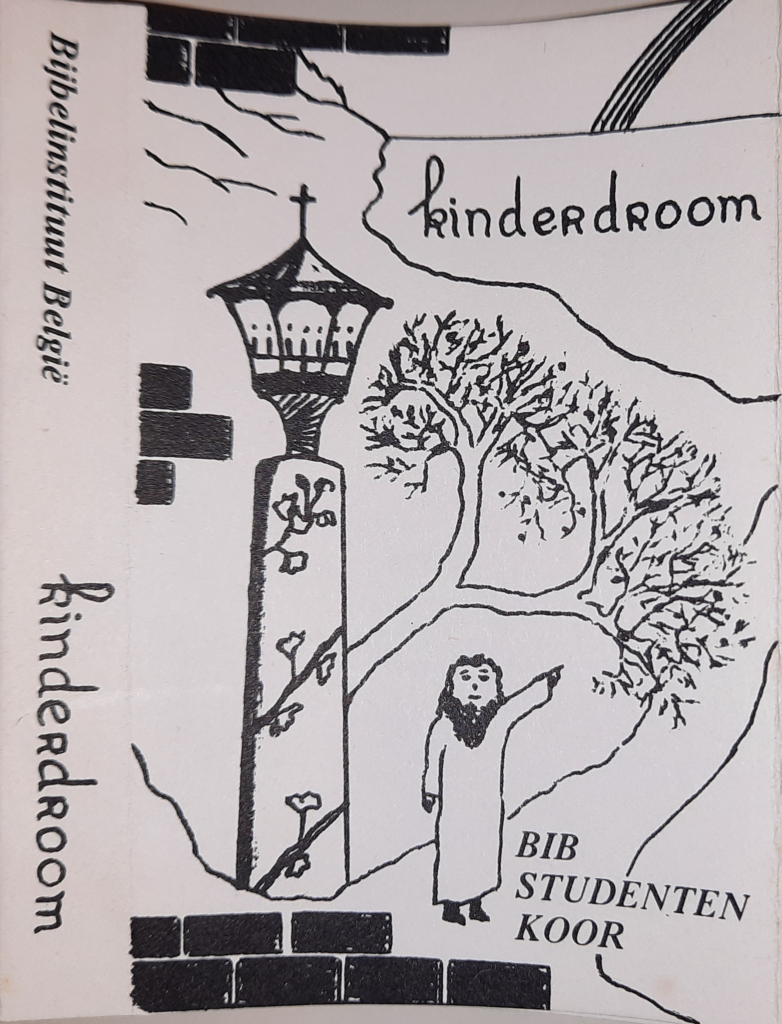
Student Choir
A significant portion of the archive relates to the Bible Institute Belgium (BIB) and the Institut Biblique Belge (now Institut Biblique de Bruxelles). For about ten years he was employed at both Bible Schools, first as a guest lecturer, but after a few years, he became a full-time staff member and choir director. The student choir also dates from this time, some recordings of 1979 and 1980 have been preserved. In addition to lectures in both national languages on church and music, he was also a coordinator of the internship program and one of the driving forces behind the “Family Weeks.” Under this heading, staff, students, and some volunteers of both Bible Schools organized vacations with sports, games, and spiritual deepening for the whole family. Separate programs were developed for adults and children under a common theme. The Flemish, Dutch, and French-speaking family weeks took place in the months of July and August.
La Douce France
In 1984 the bilingual creative jack-of-all-trades left with his wife and family for France to study theology at the Faculté Libre de Théologie Réformée in Aix-en-Provence. Naturally, this has left its traces. After completing his studies, Thienpont was hired as a teacher of practical theology and as a choir director.
Back to Belgium
In 1997 he returned to Belgium to become successively pastor of the United Protestant Church in Belgium (UPCB) in Charleroi and Ixelles. In addition to his pastorate, he taught liturgy at the Faculté Universitaire de Théologie Protestante de Bruxelles (FUTP) and the Faculty of Protestant Theology and Religious Studies, Brussels (FPTR). He also resumed his activities as a guest lecturer at the Institut Biblique Belge, the Evangelical Theological Faculty – Leuven, and the Instituut voor Bijbelse Vorming.
Why preserve?
The archive also contains many sermons, conference or formation days speeches, and notes on specific topics. In addition to music and culture, one of the topics is the position of women in the church.
In an interview with ETF intern Tom van Steenis earlier this year, Thienpont explains why he deposited his archives. “First, I am a collector and I have all kinds of documents from years away. I moved to France and Charleroi. I dragged all those documents with me. I love history and it’s hard for me to throw something away. Secondly, When people delve into historical documents, they’re always happy to find something like that. I think EVADOC is a fascinating project: to preserve traces of Protestant Flanders and Belgium. Soon there will be few written preparations and sermons. Occasionally I have also referred to something as ‘unique’. For example, when church services were observed by students. What happened in the services at that time and how did people react? You can’t find that anywhere else.”
The archive will become available for consultation in the reading room of KADOC-KU Leuven in early 2022. The inventory will then also be available online. We will keep you informed via our website.
Archives management of the local congregation. Provincial training evenings
We intend to organize provincial training evenings on the archives of the local congregation again in the fall of 2022. We would like to share our expertise so that together we can safeguard the memory of the Protestant community in our society. In the first part of the evening, we will explore questions such as: :
- Why preserve?
- What are the risks to digital archives?
- What is the difference between a backup and an archive?
- What to keep and what not to keep?
- What about the GDPR?
- ….
The second part of the evening will be rather practical. Using concrete examples, we will cover issues such as : - What is a good folder structure?
- What are good file names?
- What file formats do I use?
- What storage media or cloud services am I using?
- Archiving of emails, photos, websites, social media

Where and When?
We are currently looking for a location in each Flemish province to provide these training sessions. For the many foreign-speaking churches, we also want to provide this in-service training in English. One or more locations will be chosen depending on the interest. In consultation, it can also be considered to offer this training in French (with or without simultaneous translation).
As soon as the registration opens, you will be informed via our website. Church congregations that want to make their building available for this activity can already register with Aaldert Prins.
Stand VVP Meeting
On November 11, Evadoc was present with a booth at the VVP meeting in Leuven. It was a great opportunity to answer questions and bring EVADOC and KADOC to the attention of the general public.
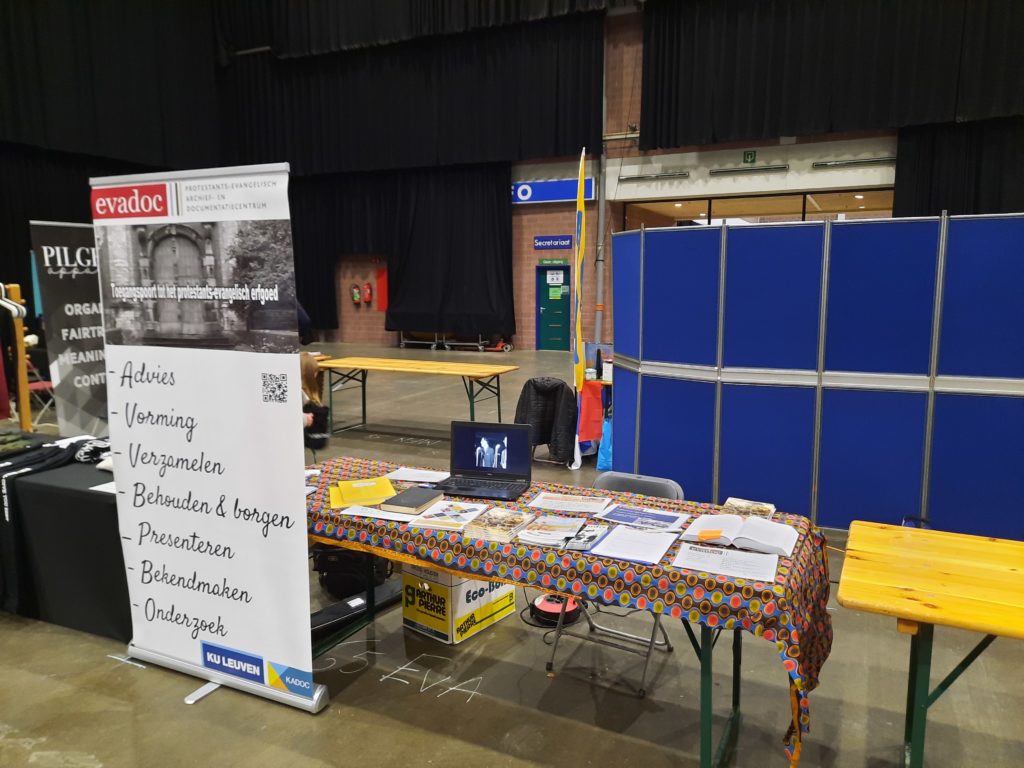
Protestant Music and Performing Art Practices. Call for Intangible Religious Heritage
Protestant and Anglican faith communities harbor a wide range of traditions and practices in music and performing arts (dance, drama, declamation, etc.). From a cultural perspective, these aspects of faith experience are described as “intangible cultural heritage” or ICE. In 2019-2020, EVADOC with KADOC and PARCUM mapped the heritage and heritage needs of Anglican, Muslim, Israelite, Orthodox, and Protestant faith communities during the project Hemelsbreed. Diverse Religious Heritage in Flanders.
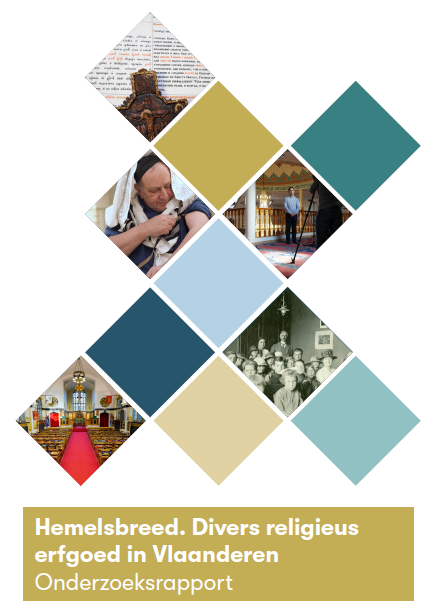
In the Spotlight
The completed questionnaires demonstrated that the concept of intangible cultural heritage is little known. Yet we are convinced that there is a lot of intangible heritage present. Together with KADOC, PARCUM, the Workshop Immaterial Heritage, and CEMPER, Evadoc wants to map this religious immaterial heritage and make it better known to the general public. Naturally, attention is also paid to the diverse and evolving meanings of this heritage.
Intangible Religious Heritage and my Congregation
To get you started a bit on what we are looking for, I will give some examples from other countries. For example, choir and choral music, with a long tradition in Protestant-evangelical circles, is registered in Germany. Another example from Germany is organ music. In the Netherlands, for example, the harmonium is on the list of intangible heritage. In Sweden, the Psalmodikon is recognized as such.
Music or stage practices around church holidays, such as Christmas or Easter, certainly can be considered as intangible heritage. And what about accompanying (children’s) songs with certain gestures or hand clapping? Undoubtedly there are also many relevant musical and performing traditions in the international or migrant churches, present in large numbers in our country. These, of course, also qualify for registration.

Why Register?
What is the advantage of recording such traditions and customs? First of all, it is a way to engage with a much wider audience in a very different way than those who attend the religious activities of a local church. In addition, your contribution also provides a better reflection of the vibrant (super) diversity of religious traditions and practices in our society.
How to Register?
Are you involved in any traditions linked to religious music and performing arts? Do you have additional questions about this call or would you like to publicize an existing practice? If so, please feel free to contact us. We are happy to support you in registrIng your intangible heritage.
Crowdfunding
In the previous newsletter, we brought to your attention the crowdfunding for the digitization of the periodicals Onze Hoop /Notre Espérance (BEZ/Vianova). Especially with the volumes up to the Second World War, a lot of issues are in poor condition.
The paper is very fragile and any manipulation leads to damage. To keep the unique and special content accessible, digitization is an absolute necessity. For this, a total of € 2,000 is needed. This money is not only needed for scanning, but also for the application of the necessary metadata (so that, for example, it can be found easily on the Internet), the durable storage of the digital files, and the preparation of the scanning. Some numbers must first be fixed.
50%
Currently (end of December) we are at half of our target amount. That means about €1,000 is still needed. Will you help us to complete the financing? Your donations are welcome on account number BE45 7340 1941 7789 of KADOC-KU Leuven with the reference 400/0020/43911. Donations from €40 are tax-deductible in Belgium.
For questions about this project, please contact Aaldert Prins.
Acquisitions
In the past few months, our collection has continued to grow. In this section, we traditionally share the acquisitions of the past few months.
New Publications
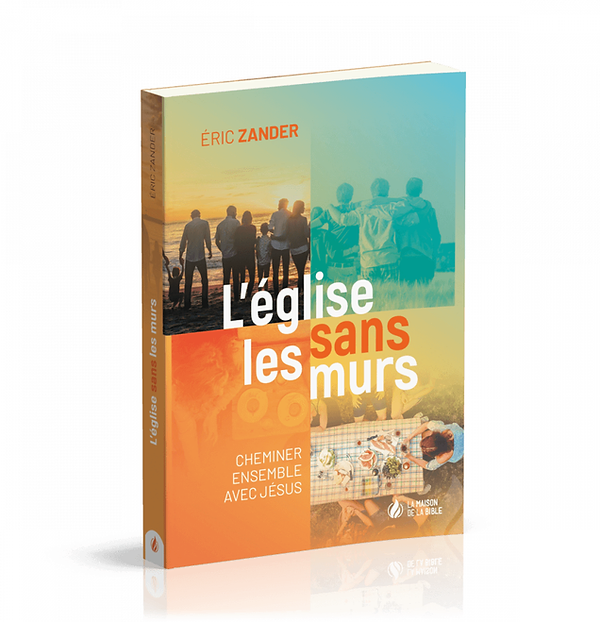
- Kerk zonder muren, Eric Zander
- Ontluikend Christendom, Daniël De Waele
- Bidden kun je leren, Anne van Olst
- Theofilus – ETF-Leuven
Older Publications
We are grateful to the Protestant Faculty of Theology and Religious Studies in Brussels for the donation of 1 pallet of publications. These are mainly titles relating to the church history of Belgian Protestantism in the 19th and early 20th Centuries.
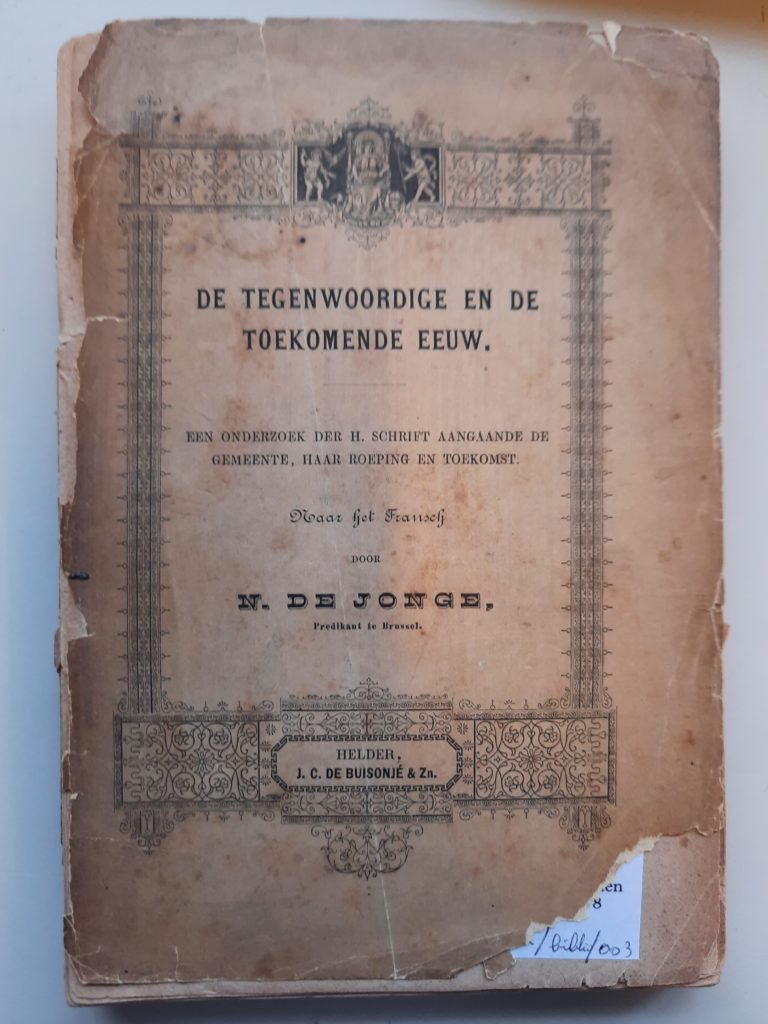
Archives
We received additions for the following personal and organization archives:
- Johan Rietdijk (whith thanks to Paul & Cees van der Laan)
- Jean-Claude Thienpont
- Diocese in Europe
- Operation Mobilisation International
Heritage Consultant
We would like to point out that Aaldert Prins as consultant EVADOC within KADOC for the Protestant heritage is happy to advise you on the management and disclosure of the heritage of local churches and organizations. A more extensive description of services can be found by clicking on this link.
Subscribe or Unsubscribe
Click on this link to subscribe or unsubscribe to the Evadoc newsletter.
